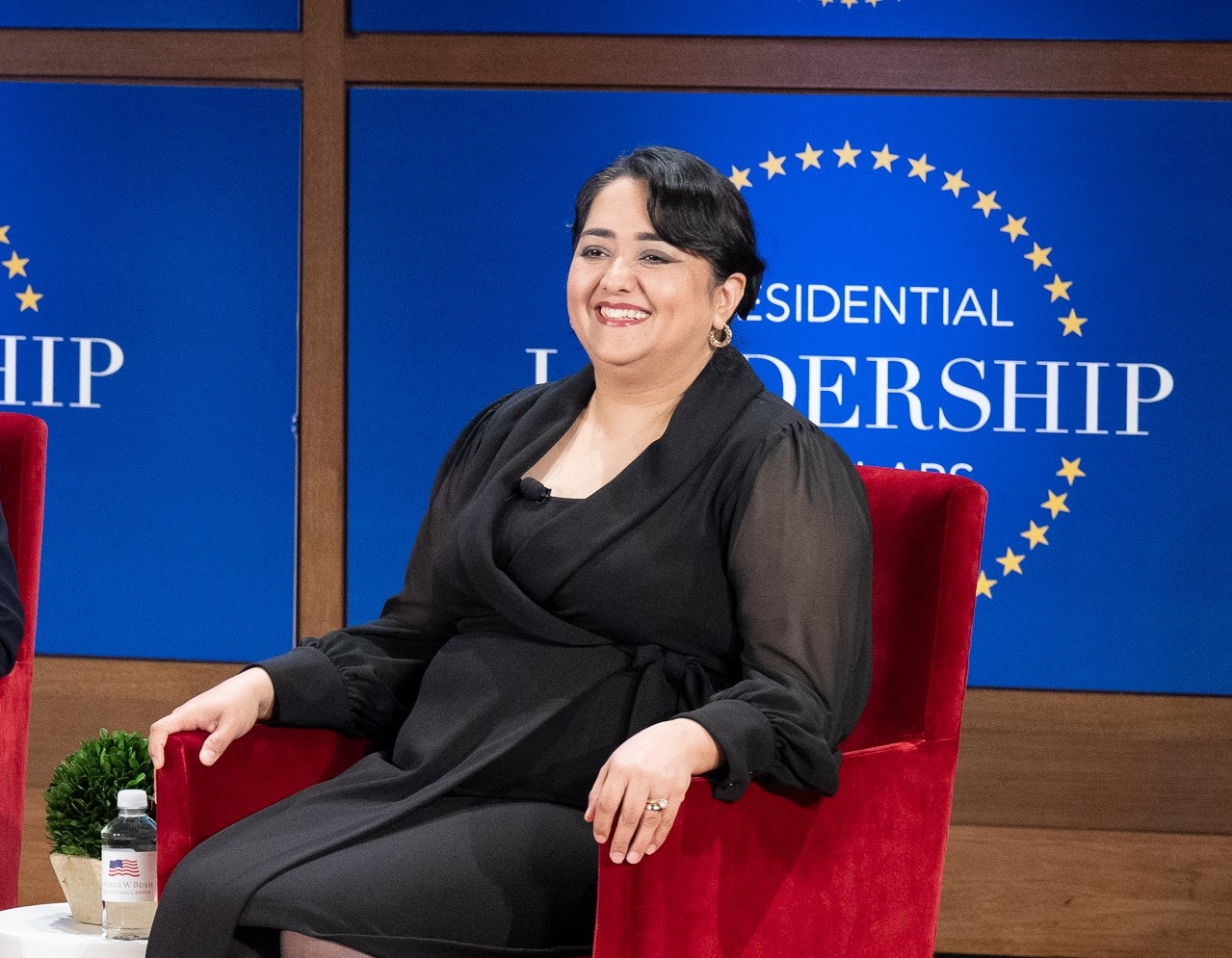In late April, Holly Kuzmich, George W. Bush Institute Executive Director, sat down with Carlos Gutierrez, former Secretary of Commerce, to discuss the impact immigrants have on the United States.
As part of a series on immigration insights, Secretary Carlos Gutierrez shares his thoughts about the United States being a welcoming country to refugees and how immigration helps strengthen the economy. At the age of 5, Secretary Gutierrez and his family escaped from the Castro regime and found refuge in the United States. In the interview, he states that refugees are the “most loyal people in the country” because “they will never forget what this country did for them.”
Transcript
Holly Kuzmich: I’m Holly Kuzmich, executive director of the George W. Bush Institute. Today, I am thrilled to be joined by Carlos Gutierrez. Carlos has had a long and distinguished career in government and in business. At the age of five secretary Gutierrez escaped from the Castro regime and arrived in the US. In his early 20s, he joined Kellogg where he rose up the ranks and eventually became CEO. In 2004, he was nominated by president Bush as secretary of commerce. And throughout his time as secretary, he advocated for immigration reform and free trade. Currently, Secretary Gutierrez is chairman and CEO of EmPath, a company that uses artificial intelligence to determine employee’s skills and proficiency. Secretary Gutierrez, thank you for being here.
Carlos Gutierrez: Thank you. Thanks for having me. Thank you.
Holly Kuzmich: Well, in the news every day is what we’re seeing at the border right now, and the migrant surge that we’re seeing. And so much of the focus right now is on the security aspects of this. And what do we literally do at the border. But I’d love for you to talk a little bit about what is really driving people here from Central America and from other countries?
Carlos Gutierrez: Yeah, I would say there are two things, two factors, one over there, and one over here. And in Central America, of course the economy is in bad shape. It’s interesting. Mexico is not doing well. And when Mexico is not doing well, Central America doesn’t do well. It’s sort of the same as the US and Mexico. So on one hand, it’s the economics there. They can’t find work. They don’t have enough to eat. They don’t have shelter. They need a new life. The other thing is that there are jobs in the US and that’s part of the problem that many people just don’t understand. There are jobs. And there is a sense that if you work hard in the US, you can achieve something. That’s sort of the reputation. But people would not be coming if they couldn’t work. And we’ve always seen that the unemployment level for immigrants is lower than the national average. So the day we don’t have any more work, they won’t come.
Holly Kuzmich: You obviously, I mentioned in your intro, you obviously came here from Cuba. And one of the other issues that’s been in the news recently is refugees and what has been our policy in the US on refugees. What should be the cap that we set? I’m curious to know your sort of overall philosophy, given who you are and your own experience. What the strength is of our country, when we accept refugees and how we should think about that as part of our overall immigration system?
Carlos Gutierrez: It’s a great question. I think that when we bring in a refugee who is really seeking refuge, who is looking for a new home desperately, we pick up one of the most loyal people in the country. Refugees will never forget what this country did for them. They feel grateful. I remember when I came in the 60s, I just felt that people were welcoming me. I felt it was a great environment. And I learned to love the country because people welcome me. And it’s such a difference. The impact it makes when someone comes to the US, they go through a process, they’re able to stay here. They become so loyal. It is a level of loyalty that I think is above average. If you think about citizens.
Holly Kuzmich: Yeah. Yeah. Can you expand a little bit on your own journey and what your path to naturalization was like?
Carlos Gutierrez: It’s actually, it was harder than the immigration bill that we were trying to pass. Well, we’re naturalized citizens. So when we came to the US, we moved to Miami, then New York, and there we applied for citizenship. Took us a few months more than it should have, because there was a person with the same name as my father who had a record. And they had to ensure that it wasn’t him. And it was a very common name. So he got through that. We got our citizenship and we moved to Mexico. Because of just the way my life turned out, I started to work in Mexico. I wasn’t a citizen of Mexico. My wife is a citizen of Mexico, and then my son was born in Mexico, but I didn’t have the time in the US that would’ve given him automatic citizenship. So we moved to the US for two years when we came back, my youngest daughter was born in Mexico.
And by then, because I spent those two years, I had enough time, having lived in the US for 10 years as of a certain date. So she became an automatic citizen. And just to complicate matters, in the US one of my daughters was born. So for about 14 years, the family was made up of three US citizens and two green card holders. And because of Kellogg, I was moving around. I was in Canada, we were in Australia. We didn’t have the five years that we needed to live in the US in order to gain citizenship. That’s a very long and tangled of saying it took us 14 years. It took me 14 years to get my family full citizenship.
Holly Kuzmich: Yep. Well, we’re glad you did.
Carlos Gutierrez: I walked out of the courthouse. I remember looking at my son and he must’ve been, I don’t know, 15, 16 years old. And I said, well, now, I can die. You’re a US citizen.
Holly Kuzmich: What is so much in the news these days is of course what we’re seeing at the border and so many of them are asylum seekers. But there’s also this important component of our immigration system around skilled workers coming from all over the world. Right. And I think a lot of the focus from policy makers right now is the immediate, what do we do at the border to process people, to treat people who humanely, but also to follow the rule of law that we have in this country. But as you think about the broader system and what we need from an employment side and a skilled worker side, where do you really see us needing to head? I mean, it’s been a long time since we’ve really done any reforms to the employment side of our immigration system.
Carlos Gutierrez: Absolutely. Absolutely. And let me just say, as a starter, when I hear someone say, I believe in immigration reform, but let’s secure the border first, that tells me that they’re not really serious about immigration reform. Because when do you get to the point where the borders 100% secure and who’s going to declare that?
Holly Kuzmich: Right.
Carlos Gutierrez: But our economy grows on the basis of the number of workers and their productivity. The birth rate in our country is not high enough for us to produce enough workers so that we can grow on our own. So we need to bring in immigrants. And then the question becomes is, who do we bring in? Do we just bring in people who want to come? Or do we have a system whereby we’re able to allocate immigration visa to high skill, to low skill, by the way, middle-skill, we need nurses, we need nurses aids, we need truck drivers. We need construction workers. We need people who can farm. We need PhDs. We need doctors, medical doctors. So our economy needs these workers. And unless we have a source to bring those workers in, our economy is going to stagnate because we don’t have enough people to drive growth. And we can’t drive economic growth only with productivity.
Holly Kuzmich: Right.
Carlos Gutierrez: So it’s an economic imperative.
Holly Kuzmich: Yeah. One of the other organizations you’re involved in is TheDream.US, which works with dreamers, as you might imagine. You’ve gotten to meet so many of these, no longer kids, now young adults living and working in the US. Tell us a little bit about your work there and why you feel so strongly about this?
Carlos Gutierrez: I think, this was started by Bill Graham who actually just… It’s a scholarship for dreamers. And the commitment is just amazing. But I think about these and most of the ones who I’ve met regardless of their age, they came at a very young age. You barely speak Spanish. When they go to Mexico, say they feel like foreigners. They’re treated like foreigners. They’re made fun of because they really don’t speak Spanish. They played baseball. They played in little league. The only thing they know is US culture. That’s all they know. So they are as American as anyone else. Except when they came over, they didn’t get a piece of paper that said, so.
To expel a dreamer from the country is boy, it’s a tough decision. It verges on cruel because they are American. They speak like American. Their habits are American. They love apple pie. I mean, it’s just everything. So I think they should be given the right to become citizens. Immigration reform is a different story. It’s so complicated. 7,000. Sorry. Yeah. 7,000 pages. There’s so many details to it. But the dreamers I think, are a separate situation. They didn’t decide to come. They live here and this is the only home they have.
Holly Kuzmich: Yeah. Obviously what we’re all interested in, and I know you shared this interest is getting Congress to really dig in on this issue and really take it up. It’s been way too long. And we’re long overdue. As you think about policy makers on Capitol Hill right now, any advice for them about how we take the temperature down a little bit and actually get to work on this?
Carlos Gutierrez: Yeah. I think the first thing is to recognize what we said is that we need an organized system of immigration. I would advise whoever’s negotiating an immigration bill to be ready to compromise. I think in the past, what has happened is sides have taken a very absolute position. For example, there has to be a path to citizenship in 10 years. That immediately loses a big constituency. Maybe there’s a path to legalization. And citizenship is a totally different process.
The other thing I would say is negotiate with people who you believe really want this. As I look back now, I realize that on our side of the aisle and Republican side, they were people negotiating who didn’t really want a deal. And they just kept making it more difficult and more difficult. The third thing I would say is this is not just a Republican problem. And I can tell you that on the floor of the Senate, the poison pills that were introduced in order to bring down the, what was the Kennedy Kyle bill.
Holly Kuzmich: Right.
Carlos Gutierrez: Were from the other party. Why? Well, I guess they didn’t want a Republican to be the one to reform immigration.
Holly Kuzmich: Right.
Carlos Gutierrez: So the political level. I can’t think of another issue that is more political than immigration. So, but I’ll tell you whatever people come up with will be very similar to what we had in 2006.
Holly Kuzmich: Yeah. And probably 2013 as well. Right. There’ve been similarities,
Carlos Gutierrez: That’s right.
Holly Kuzmich: Along the way. Every time we really get into this, it is going to look similar. It’s just going to take the right people sitting down and taking it seriously.
Carlos Gutierrez: That’s absolutely right.
Holly Kuzmich: Okay. My last question for you is just what would you encourage people to really focus on in this debate that we’re not talking enough about? I mean, as you know, this issue becomes pretty political pretty quickly, but what are we sort of forgetting to highlight in this conversation?
Carlos Gutierrez: Well, I don’t hear enough about the economic side. It’s an emotional debate. It’s a nationalist debate. It’s, who are we as a country? And should immigrants come to the US? And some people believe that they can’t assimilate, which I think is just amazing. Because if you look around Italians, Irish, Greeks, they’ve all of assimilated. And Hispanics will be no different. But we don’t talk enough from an economic point of view. Boy, you go to venture capitalists in Silicon Valley, they’re from India, from China, from all over the world. And if we didn’t have them, we’d have a very different economy.
So that’s the part that is missing in the debates. The debates get emotional. Why should someone gets citizenship if they are not American? Why should they come here and take somebody else’s job? We need to explain the practicalities of our economy and understand that immigration is first and foremost, an economic strategy. And people make it out to be a humanitarian strategy, which is very easy to shoot down because you can always say, look, we have to take care of our people first. But it really isn’t a humanitarian strategy. It’s an economic strategy.
Holly Kuzmich: Yeah. Well, Secretary Gutierrez, thank you for being with us today. You bring really important insights into this conversation and we appreciate it.





























